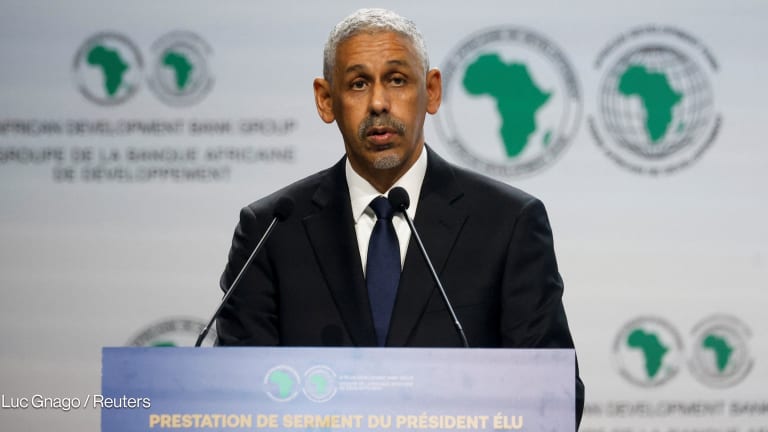
The World Health Assembly confronts a new Ebola outbreak, the African Development Bank channels South Korea, and engagement with North Korea fades. This week in development:
Global health leaders are gathered at the Palais des Nations in Geneva, where they are working to secure buy-in for the World Health Organization’s five-year program of work — and to show that the United Nations’ health body is well-positioned to tackle the world’s most pressing health challenges. Against the backdrop of a new Ebola outbreak in Democratic Republic of Congo, WHO Director-General Tedros Adhanom Ghebreyesus — who recently returned from a trip to the frontlines of the Ebola containment effort — said in his opening remarks that WHO is “much better placed to deal with this outbreak than we were in 2014.” The institution was widely criticized for failing to respond quickly enough when Ebola erupted in three West African countries four years ago. Peter Salama, deputy director-general of emergency preparedness and response, told Devex on the sidelines of the WHA that the situation in DRC currently stands “on an epidemiological knife-edge.” Last week’s confirmation of a case of Ebola in the city of Mbandaka heightened concerns that the virus could spread through densely populated areas. WHO is now leading a critical vaccination campaign for about 1,000 people, Salama said — a possibility that did not exist during the last Ebola outbreak.
In addition to pandemic security, health leaders at WHA are highlighting efforts to combat other diseases that demand international attention and resources. In anticipation of the first-ever U.N. high-level meeting on tuberculosis, which will take place in New York in September, WHO member states are preparing a new accountability framework aimed at ending the disease. The WHO is also making a renewed push to achieve polio eradication this year after missing a 2017 eradication deadline. Tedros has put significant focus on the WHO’s internal capabilities and policies. In his opening remarks he drew applause for challenging the organization to “treat our interns much better than we do.” The assembly has also provided another opportunity to highlight the significant gender gap in global health leadership.
The African Development Bank is holding its annual meetings in Busan, South Korea, where African leaders, development experts, and AfDB officials are focused on charting a path to economic growth at a time of rapid transition. Much of the focus of these meetings is on the possibilities for industrialization to harness African nations’ growing populations of young people. AfDB President Akinwumi Adesina’s “High 5” agenda includes a commitment to “industrialize Africa,” with six flagship programs aimed at meeting this goal: fostering industrial policies and developing industrial clusters, scaling financing to small and medium enterprises, and facilitating links to potential partners and investors. For the first time, a World Bank president is also attending the AfDB meetings. Korean-born President Jim Yong Kim urged attendees to keep in mind that when East Asian countries such as South Korea managed to achieve rapid industrialization, they did so by investing early in education — in some cases even before institutions such as the World Bank advised them to do so.
On Thursday, President Donald Trump abruptly canceled a planned historic summit with North Korea Chairman Kim Jong Un, where the two leaders had intended to discuss denuclearization, security, and economic investment in North Korea’s isolated economy. With the summit now indefinitely postponed, it appears likely that humanitarian and development organizations will continue to find it difficult to navigate a uniquely challenging operating environment — restricted by international sanctions — that complicates work in North Korea, despite the country’s deep food security and health challenges.








